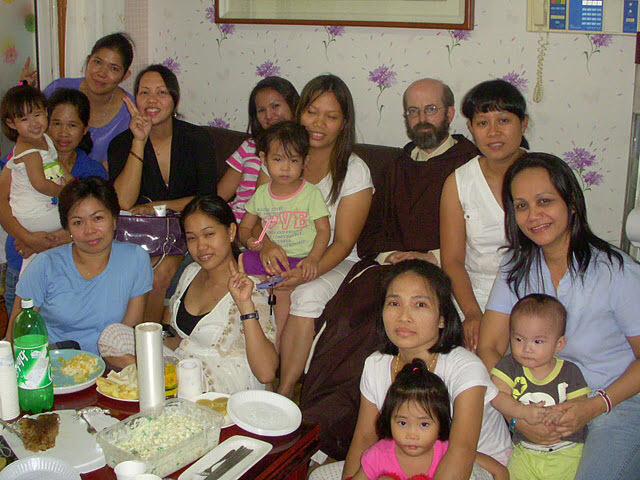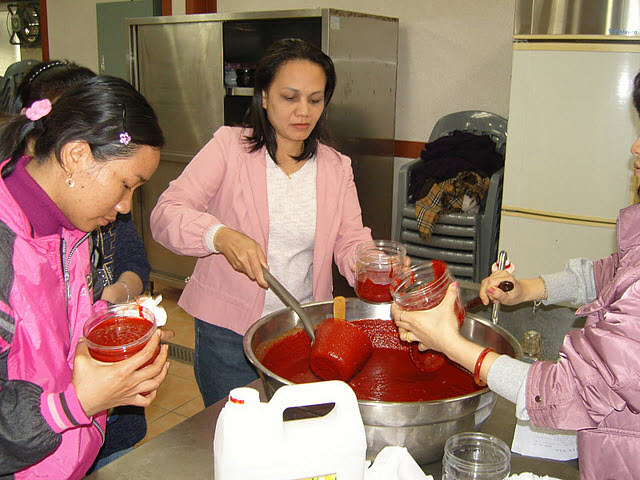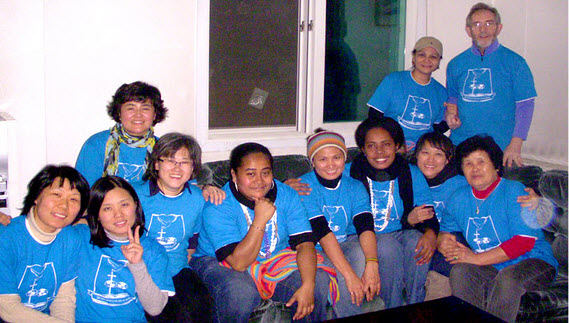Immigrant Spouses Journeying Towards Employment
By Necita A. Fetalvero
Necita or Cita, originally from Tubod, Lanao del Norte, Philippines, has a degree in Psychology. She joined the Columban Lay Mission orientation program in 2001. During her first and second mission terms in Korea she worked with the urban poor, based in a mission parish in Seoul. She facilitated liturgies and visited the elderly. She taught English to poor children and was also involved in Catholic scouting, which assists youth programs in the parish and in schools. After her sixth year as a Columban lay missionary she began to minister to multi-cultural families in Ganghwa Island. She writes about that here.
Cita is now home for good after nine years of mission work in Korea. She left the Columban Lay Missionaries to look after her aging and ailing parents. Her father was paralyzed by a stroke 20 years ago and his condition deteriorated last year. Her mother is suffering from diabetes and is scheduled for an eye operation soon.

Cita (far right) and Fr Laurence Kettle OFMCap with some Filipino women married to Koreans.
Reality
The presence of immigrant spouses in Korea, together with the even larger population of immigrant laborers, has challenged Korean society, homogeneous from time immemorial. With the recent rise in multi-cultural families, the government’s assistance program has helped foster acceptance of diversity and integrate multi-cultural families into mainstream society. According to the latest marriage statistics, one out of ten marriages is international. International marriages involve mainly two groups of men – those in rural areas who had never been married and divorced men of low socio-economic status in urban areas.

Cita during a demo on the preparation of Korean chili paste.
It is a reality that an increasing number of women are emigrating, whether for marriage or for better economic opportunities through work. Another contributing factor in the rapid increase of international marriages in Korea is the institutionalization of marriage brokers, both local and overseas. Brokers in Korea take Korean men to a pre-arranged overseas site where potential brides gather and it takes less than a week for the selection and simple wedding ceremony. Most of these women are from China and Southeast Asian countries. As the number of multi-cultural families increase, the level of problems faced by foreign wives and their children has also gone up. Most of these problems are related to the commercialization of broker-arranged marriages, domestic violence, conflicts with in-laws, discrimination against mixed-raced children, culture shock and language barriers.

Cita and Columban Fr Seán Conneely (standing) with friends from different countries.
Response
The great need for ministry to women in international marriages and the multi-cultural dimension of Columban mission have led me to respond to this call and challenge in my mission. It is taking an active part in challenging society as it moves from being a one-ethnic group to being a multi-cultural one, a patriarchal society being challenged by the empowerment of the women of today. It was September 2009 when I started working at Ganghwa Gun Multi-cultural Family Center. Ganghwa is the fifth largest island in South Korea, in the estuary of the Han River on the west coast of South Korea, separated from the Korean mainland by a narrow channel, spanned by two bridges passable by public transport. North Korea is directly across the channel on the north coast of the island. There are about 65,000 inhabitants, mostly older people in the island, with about 300 multi-cultural families. They are engaged in farming and fishing. The Vietnamese form the largest number of foreign spouses, followed by Chinese and Filipinos. The rest are other South East Asian women.
Challenge
While I help at the center’s ongoing programs that facilitate adjustment to Korean culture, agricultural training and education, Korean cooking and language  classes, a child-rearing program, home visitation and other family activities, I have been deeply touched by the stories of the young women, accepting a whirlwind marriage and moving from their own cultures as they settle into an unfamiliar environment. Their stories of everyday lives, struggles, failures, learning, hopes and dreams as immigrant wives are very inspiring. Even if a language barriers and cultural differences often cause friction and conflict in their marriages, they make an effort to speak for themselves without fighting but by negotiation. Even if some families and husbands see these women as having been purchased for marriage, they prove themselves to be strong and they assert their cultural identity as immigrant wives with rights equal to those of Koreans.
classes, a child-rearing program, home visitation and other family activities, I have been deeply touched by the stories of the young women, accepting a whirlwind marriage and moving from their own cultures as they settle into an unfamiliar environment. Their stories of everyday lives, struggles, failures, learning, hopes and dreams as immigrant wives are very inspiring. Even if a language barriers and cultural differences often cause friction and conflict in their marriages, they make an effort to speak for themselves without fighting but by negotiation. Even if some families and husbands see these women as having been purchased for marriage, they prove themselves to be strong and they assert their cultural identity as immigrant wives with rights equal to those of Koreans.
Given the special task by the center of handling individual and group counseling for Filipino women in their native language, I have come to appreciate their vulnerability and strength in their journey. They need much more than counseling so I started a program in basic women’s orientation and leadership training, for they are potential leaders. As we share our lives together I meet them regularly for prayer and Bible sharing to deepen their faith. Their lives also deepen my faith. It is my hope and the goal of the center that what we have started with the Filipino women will also be organized for other immigrant women in the area.
My missionary life is enriched by my journey with women in their struggle for their integration into their Korean family, culture and society and in their journey towards empowering themselves. I serve as a little bridge for both cultures to walk on – Korean families and immigrant wives. I believe that mission in this particular ministry is not just prescribing change but rather journeying in the direction of balance in our churches, into our families and in our society – rediscovering the feminine side of God in an all-male image of God in the society.
You may email Cita at lucille1017@yahoo.com and find her on Facebook under the name ‘Necita A. Fetalvero’.
